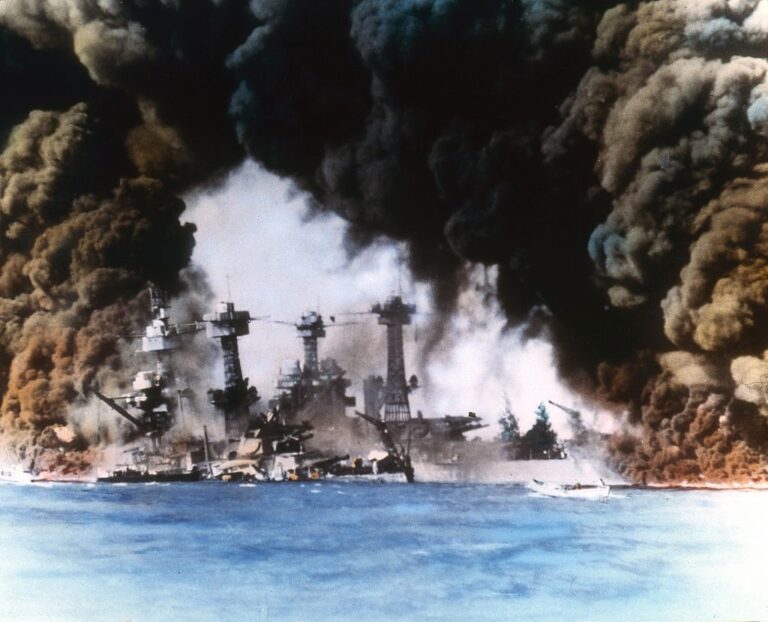Attack on Pearl Harbor: Bringing America into World War II
The United States was staying out of the war – until Japan’s surprise attack at Pearl Harbor.
By: Sarah Cowgill | December 7, 2023 | 425 Words

(Photo by US Navy/Interim Archives/Getty Images)
It was a date that, as promised by President Franklin Delano Roosevelt (FDR), lives on in infamy. On December 7, 1941, the Imperial Japanese Navy Air Service executed a military strike on the United States Pacific Fleet at Pearl Harbor, located on the island of Oahu, Hawaii. The attack killed 2,403 U.S. service members and injured 1,178, as well as destroying six battleships and 169 planes. It led the United States into World War II – a result the Japanese would regret.
In the late 1930s, foreign policy and diplomacy in the Pacific was tied to support for China. Japan’s aggression against China was a sore spot with the U.S. and diplomatic relations were getting worse, though no one expected the attack.
The president addressed the nation to explain the surprise strike on U.S. soil:
“The United States was at peace with that nation, and, at the solicitation of Japan, was still in conversation with its government and its emperor looking toward the maintenance of peace in the Pacific. Indeed, one hour after Japanese air squadrons had commenced bombing in the American island of Oahu, the Japanese ambassador to the United States and his colleague delivered to our secretary of state a formal reply to a recent American message. While this reply stated that it seemed useless to continue the existing diplomatic negotiations, it contained no threat or hint of war or armed attack.”
The Plan to Cripple America
The Japanese Imperial Navy, under Admiral Isoroku Yamamoto, plotted for a year how best to decimate the U.S. Navy. Yamamoto understood the only way to decimate American military power was in a coordinated surprise attack. Over a span of two days, the synchronized assault by Yamamoto left Pearl Harbor, Malaya, Hong Kong, Guam, the Philippine Islands, Wake Island, and the storied Midway Island in ruins.
The president addressed Americans with a radio address, to explain the nation’s entry into war:
“Japan has, therefore, undertaken a surprise offensive extending throughout the Pacific area. The facts of yesterday and today speak for themselves. The people of the United States have already formed their opinions and well understand the implications to the very life and safety of our nation. As commander in chief of the Army and Navy I have directed that all measures be taken for our defense. But always will our whole nation remember the character of the onslaught against us.”
What the world – and FDR – did not know was that the events of the day were the catalyst to the U.S. becoming a global superpower.
















